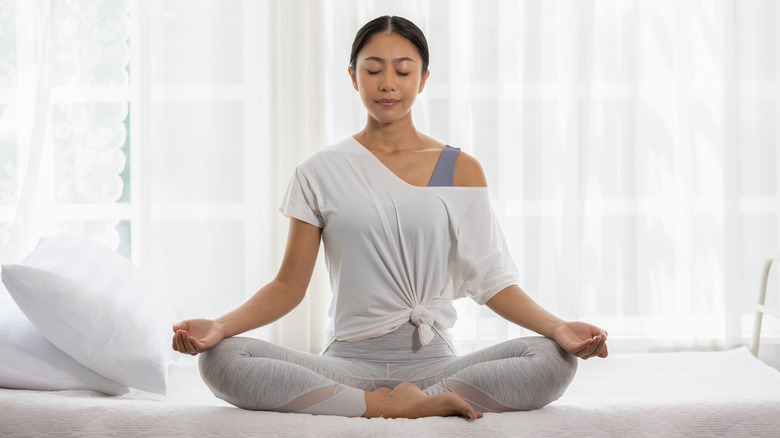What Is 'Conscious Sleep' And How Can It Help Your Awareness?
If you want to be a master of your own sleep, it's not just about powering down electronics before bed or avoiding caffeine before you tuck in for the night. Prioritizing relaxation around bedtime can help prepare your body for a night of quality sleep, and it may even allow you to transcend the unconscious experience of being in a sleep state. According to mindbodygreen, it's totally plausible to be able to achieve a conscious awareness while sleeping, called "conscious sleep." Just how is that possible, though? Well, that's the tricky part. Like any well-honed skill, experts say it's possible to remain conscious while we sleep, but it takes a lot of effort to get there.
According to Cleveland Clinic, several parts of the brain are active while we sleep. Scientists have studied the ways in which our brains are active throughout the sleep cycle, which includes both REM and non-REM sleep. REM sleep is characterized by higher levels of brain activity, while non-REM sleep consists of important stages that contribute to growth and rejuvenation. As your body goes through the various stages of sleep, the experience has traditionally been thought to be largely unconscious (per mindbodygreen). But according to the premise of conscious sleep, the attainment of consciousness during slumber may be a reality. So what is conscious sleep, and can it help our sleep quality, feelings of restoration, and awareness?
Conscious sleep means letting go of the body
Conscious sleep can be thought of as similar to lucid dreaming, when a person is aware that they're dreaming, which has been studied in Western medicine (via mindbodygreen). The primary difference between lucid dreaming and conscious sleep is that the former is recognized in Western studies as only being present during REM sleep, while the latter is taught in Eastern meditation practices as a way to become closer with one's own self-awareness. Dr. Jacob Teitelbaum, author of "From Fatigued to Fantastic," tells mindbodygreen that he defines the experience of conscious sleep as "the ability to be aware of the self, but not of our body or surroundings, during different stages of sleep."
Per the Isha Foundation, which teaches yoga and meditation practices, the act of sleeping consciously is one in which no sense of the body should be felt. The comparison is that when we are awake, our energy and consciousness are channeled into physical acts like sitting, standing, walking, and generally moving around. When we sleep, it's believed that it's possible to let go of identification with the body but to keep a sense of being aware and conscious. While there is little scientific backing to support the claims of conscious sleep, there are still many benefits to bringing meditation and awareness into your sleep hygiene.
Achieving conscious sleep
In fact, meditation has been used in various ways to help people sleep better and become more connected with themselves (per Sleep Foundation). There are many ways in which sleep is intrinsically intertwined with meditative practices, including yoga, and conscious sleep can be related to a deep meditation. A "yogic slumber," or Yoga Nidra, is a practice where you're able to transport yourself into a completely relaxed but conscious state, says Marie Claire. In remaining aware during these deep meditations, you can experience a closer relationship with your consciousness.
Regardless of whether or not you can achieve a state of conscious sleep, sleep meditations are helpful ways to allow both your body and your mind to ease into sleep (per Verywell Mind). You don't have to strive for conscious sleep to reap the benefits of meditation on your sleep quality. Doing a relaxed sitting meditation prior to bed, or meditating as you fall asleep, are both good ways to free your mind of psychological clutter and help you achieve restorative slumber.
Dr. Virginia Blackwell tells mindbodygreen that the best way to improve your chances of achieving conscious slumber, or any form of deep meditation, is to practice sleep hygiene. Tips for healthy sleep hygiene include turning off screens, not drinking alcohol or caffeine before bed, and having a consistent, relaxing bedtime routine. When you are able to be in a relaxed state, you are more likely to experience conscious sleep and its benefits.



